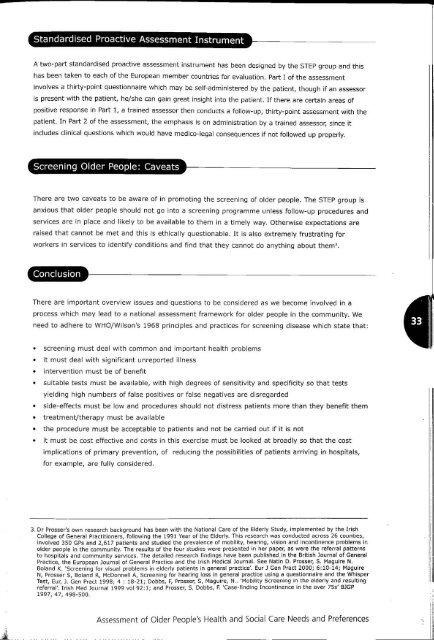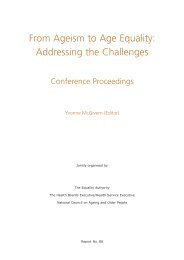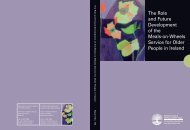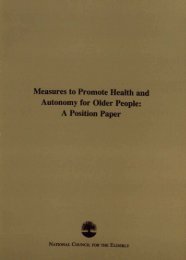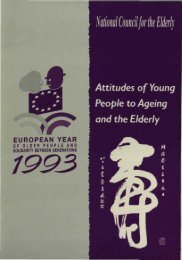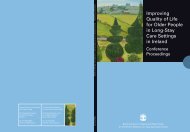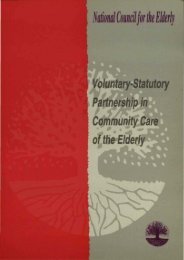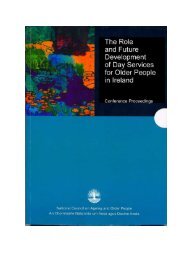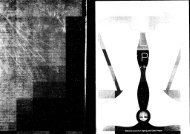Assessment of Older People's Health and Social Care Needs and ...
Assessment of Older People's Health and Social Care Needs and ...
Assessment of Older People's Health and Social Care Needs and ...
- No tags were found...
Create successful ePaper yourself
Turn your PDF publications into a flip-book with our unique Google optimized e-Paper software.
.~A..aSt<strong>and</strong>ardised Proactive <strong>Assessment</strong> InstrumentA two-part st<strong>and</strong>ardised proactive assessment instrument has been designed by the STEP group <strong>and</strong> thishas been taken to each <strong>of</strong> the European member countries for evaluation. Part I <strong>of</strong> the assessmentinvolves a thirty-point questionnaire which may be self-administered by the patient, though if an assessoris present with the patient, he/she can gain great insight into the patient. If there are certain areas <strong>of</strong>positive response in Part 1, a trained assessor then conducts a follow-up, thirty-point assessment with thepatient. In Part 2 <strong>of</strong> the assessment, the emphasis is on administration by a trained assessor, since itincludes clinical questions which would have medico-Iegal consequences if not followed up properly,Screening <strong>Older</strong> People: CaveatsThere are two caveats to be aware <strong>of</strong> in promoting the screening <strong>of</strong> older people, The STEP group isanxious that older people should not go into a screening programme unless follow-up procedures <strong>and</strong>services are in place <strong>and</strong> likely to be available to them in a timely way. Otherwise expectations areraised that cannot be met <strong>and</strong> this is ethically questionable. It is also extremely frustrating forworkers in services to identify conditions <strong>and</strong> find that they cannot do anything about them'.__1---------There are important overview issues <strong>and</strong> questions to be considered as we become involved in aprocess which may lead to a national assessment framework for older people in the community. Weneed to adhere to WHO/Wilson's 1968 principles <strong>and</strong> practices for screening disease which state that:• screening must deal with common <strong>and</strong> important health problems• it must deal with significant unreported illness• intervention must be <strong>of</strong> benefit• suitable tests must be available, with high degrees <strong>of</strong> sensitivity <strong>and</strong> specificity so that testsyielding high numbers <strong>of</strong> false positives or false negatives are disregarded• side-effects must be low <strong>and</strong> procedures should not distress patients more than they benefit them• treatment/therapy must be available• the procedure must be acceptable to patients <strong>and</strong> not be carried out if it is not• it must be cost effective <strong>and</strong> co5ts in this exercise must be looked at broadly so that the costimplications <strong>of</strong> primary prevention, <strong>of</strong> reducing the possibilities <strong>of</strong> patients arriving in hospitals,for example, are fully considered.3. Dr Prosser's own research background has been with the National <strong>Care</strong> <strong>of</strong> the Elderly Study, implemented by the IrishCollege <strong>of</strong> General Practitioners, following the 1991 Year <strong>of</strong> the Elderly. This research was conducted across 26 counties,involved 350 GPs <strong>and</strong> 2,617 patients <strong>and</strong> studied the prevalence <strong>of</strong> mobility, hearing, vision <strong>and</strong> incontinence problems ir,older people in the community. The results <strong>of</strong> the four studies were presented in her paper, as were the referral patternsto hospitals <strong>and</strong> community services. The detailed research findings have been published,in the British Journal <strong>of</strong> GeneralPractice, the European Journal <strong>of</strong> General Practice <strong>and</strong> the Irish Medical Journal. See Natin D. Prosser, S. Maguire N.Bol<strong>and</strong> K. 'Screening for visual probiems in eiderly patients in general practice'. Eur J Gen Pract 2000; 6:10-14; MaguireN, Prosser S, Bol<strong>and</strong> R, McDonnel1 A, Screening for hearing loss in general practice using a questionnaire <strong>and</strong> the WhisperTest, Eur, J. Gen Pract 1998; 4 : 18-21; Dobbs, F, Prosser, S, Maguire, N.. 'Mobility Screening in the elderiy <strong>and</strong> resultingreferral'. Irish Med Journal 1999 vol 92: 1; <strong>and</strong> Prosser, S. Dobbs, F. 'Case-finding Incontinence in the over 755' BJGP1997,47,498-500.<strong>Assessment</strong> <strong>of</strong> <strong>Older</strong> <strong>People's</strong> <strong>Health</strong> <strong>and</strong> <strong>Social</strong> <strong>Care</strong> <strong>Needs</strong> <strong>and</strong> Preferences


